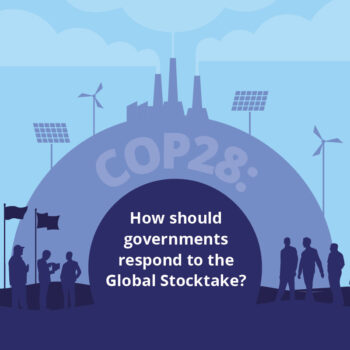The world is walking a precarious path. We have not seen this level of conflict since WWII. We have never seen this level of climate impacts, hurting people, impinging on our economies, and pushing our natural systems to the point of no return. Inflation is costing families dearly, harming business, increasing the cost of capital and causing politicians to reach for protectionism.
COP28 can be a moment for the world to come together to chart a hopeful path out of this situation. A path fuelled by the opportunities of climate action that signals shared responsibility, and solidarity in the face of adversity.
The response to the first Global Stocktake (GST) is the political opportunity to give a new vision and direction to societies and economies worldwide. An ambitious, effective response is vital to upholding the climate pillar of multilateralism. The window is rapidly closing for policy and investment decisions to limit warming to 1.5C, and the deadline for new NDCs in 2025 is looming. COP28 need to send strong signals to markets immediately, and guide the actions governments need to take over the next two years.
Ministers can shape an ambitious package by setting out these priorities for COP28:
Adaptation
The GST response and Global Goal on Adaptation need to set how we will reduce vulnerability and build resilience globally.
- By signalling a shared aim – e.g. ensure all communities have resourced climate adaptation plans, access to early warning systems, and infrastructure resilience.
- By agreeing guidance to Parties on scaling up national and locally-led adaptation planning capacity.
- By agreeing guidance on scaling up finance – possibly including a floor for adaptation finance, simplifying access to funds, and channelling resources to the local level.
Finance
The GST response, Article 2.1C and New Collective Quantified Goal on Climate Finance agreements need to signal our shared aim to mobilise the scale of finance needed to deliver climate transitions, adaptation, and loss and damage response.
- By acknowledging the late delivery of the $100bn goal and reinforcing the expectation to exceed it, while acknowledging the real scale of finance needed from all sources.
- By calling on the whole finance system to support national financing strategies that build on support for country-led platforms across finance providers.
- By expanding calls from COP27 for international financial institutions to align with Paris Agreement goals and drive transformations across the international financial architecture to deliver climate resilient development, recognising the leadership of the Bridgetown Initiative, V20’s Accra-Marrakech agenda, the Africa Climate Summit Nairobi Declaration, and the Paris Pact for People and Planet.
- By recognising the contingency of finance and support to enable developing countries to go further on climate action
Mitigation
The GST response, Mitigation, and Just Transition Work Programme agreements need to demonstrate our resolve to keep 1.5C within reach.
- By recognising the critical importance of global emissions peaking before 2025 and rapidly reducing across all sectors, reaching net zero by mid-century.
- By agreeing a package of goals and delivery mechanisms to accelerate a just, equitable and orderly energy transition. There must be explicit collective agreement: triple renewables investment and capacity by 2030, double annual rate of energy efficiency improvement by 2030, accelerate the phase out of fossil fuels, reduce related methane emissions to near zero by 2030, remove/reduce and repurpose fossil fuel subsidies. Crucially we must provide support to the poorest and most vulnerable to enable an equitable transition to a renewables-based energy system.
- By calling for upcoming NDCs and LTSs to reflect economy-wide targets covering all sectors and all gases from 2030 onwards, well ahead of COP30, and to reflect collective mitigation agreements in domestic policy.
- By inviting businesses, investors and other non-party stakeholders to develop and disclose transition plans and align investment portfolios to support collective agreements/goals.
Loss and damage (L&D)
The GST response and loss and damage fund and funding agreements need to demonstrate a significant shift in resourcing developing countries to respond to climate impacts.
- By recognising the need for developed countries to make commitments to L&D fund.
- By recognising the need for multiple sources of finance for loss and damage, and the need for action from IFIs, disaster response and insurance ecosystems to scale up and improve their support.
Equity
The GST response must address equity. The basis for equity was clear in the Paris Agreement. Our response should recall this, including noting flexibility for least developed countries and small island developing states, and the role of finance in supporting higher ambition for developing countries. In Paris, countries agreed, ‘over time’ to progress the ambition of their climate targets and move towards economy-wide targets. Eight years later, that time has now come.



